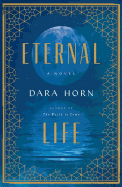
Dara Horn's fifth novel, Eternal Life, is a beautiful but melancholy exploration of mortality as the element of human existence that's essential to life's meaning.
Rachel, an 18-year-old woman living in the first century of the Common Era, is mother to Yochanan ben Zakkai, who will one day become an eminent Talmudic scholar. When her infant son becomes desperately ill, she strikes a terrible bargain with Elazar, the son of the Temple high priest and her lover, agreeing to endure eternal life in exchange for her son's recovery. Over the next 2,000 years, Rachel experiences repeated cycles of death and rebirth.
In the portion of the novel set in the present, Rachel spars with her granddaughter Hannah, a genetics researcher and someone who Rachel calls one of the "new high priests," over the young woman's project to unlock the secrets of, and attempt to defeat, the aging process. Acutely conscious of the passage of time, Hannah bemoans the "secret passage underneath everything that's always flowing with this constant stream of sorrow, and no one can see it, but we all know it's there," as she watches her young children move through life's stages. But far worse, based on Rachel's bitter experience, is the pain of an unending existence.
For a short novel, Eternal Life swiftly traverses an impressive swath of history. Horn (In the Image) is well versed in Jewish religion and culture, and brings that knowledge to bear on her story unobtrusively and effectively, making this a novel that will appeal to both Jewish and non-Jewish readers. --Harvey Freedenberg, attorney and freelance reviewer

